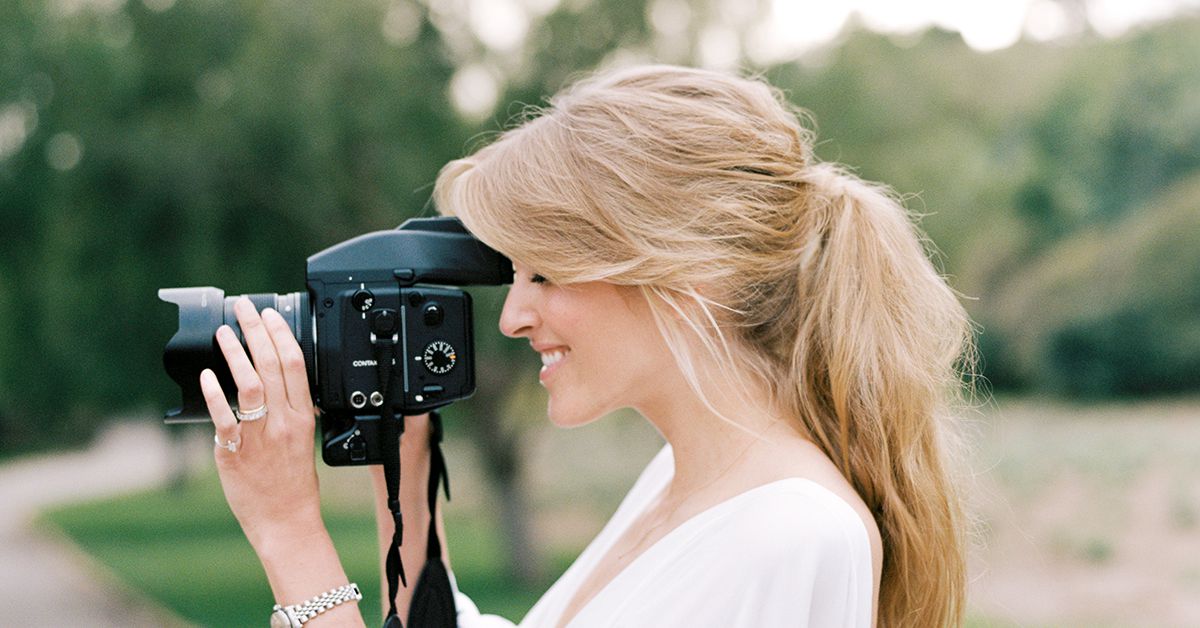
You may not be enough of a film buff to explain what makes a movie an award-winning blockbuster or a forgettable flop, but you certainly know what you like. Whether you’re a sucker for a great rom-com, can’t get enough of twisty docu-dramas, or prefer the Old Hollywood classics, you should be just as excited about your wedding video as you are about your favorite big-screen flicks.
Finding a videographer whose style is a match for your wedding-day vision and innate personality might take some research—and more than a few meetings—but having an idea of what you want can make the process go more smoothly. Here, videographer Megan Pettus weighs in on the different styles you’ll come across and the key elements you should look for when reviewing films. One key: Work with a videographer who understands that the joy of your event should take center stage. “It’s so crucial that your video team can read the room and know how to act to preserve the emotions and moments as they unfold,” says Pettus. “This is your wedding day, not our opportunity to direct a blockbuster film.”
The 5 Most Common Wedding Videography Styles
Ready to start considering your videography options? Pettus says these are five common wedding videography styles to consider: documentary, cinematic, traditional, storytelling, and vintage. Here, what to know about each and pros and cons to keep in mind.
Documentary
A documentary-style videographer will have an “utterly hands-off style of filmmaking,” says Pettus. Expect your filmmakers to stay in the background, capturing moments as they happen naturally and without direction—no pulling together groups of friends on the dance floor to wave at the camera or asking the couple to twirl during their portraits. “Sometimes, a documentary style of videography will mean less polished, more ‘off-the-cuff,” says Pettus. “Think of how The Office was filmed: The camera work may be handheld and a little shaky.” The result: A behind-the-scenes look at the way your day unfolded, often with moments even you and your partner missed. If you prefer something extremely curated and polished, this style might not be right for you.
The final version of a documentary-style film “may be less story-driven and more sequential,” says Pettus, who offers a documentary edit as one of her company’s options. “[Our] video is every moment in sequential order from the wedding weekend with natural audio, no added music, and minimal editing,” she says. “It’s been lovingly referred to as the ‘FOMO edit’ because it shows every moment, like a home video of the weekend—albeit an elevated one.”
Cinematic
While “cinematic video” may sound like an oxymoron, it’s really more of an industry shorthand, says Pettus. “A cinematic videographer creates a beautiful, curated, and purposeful film for you that makes you feel like you’re watching a movie.” You can expect a cinematic edit to include carefully chosen music, audio of toasts and speeches from your reception, and “the overarching story of the couple’s wedding and relationship,” says Pettus. “[Ours] are styled to match the vibe of our clients’ weddings.”
Traditional
Traditional wedding videos have fewer frills: No flashy transitions, minimal music, basic editing. Still, there’s an old-school vibe that many couples find appealing. “A traditional wedding videographer will be more like what your parents had,” says Pettus. “They aren’t there to get creative. They film everything as-is and deliver it as-is, and they tend to edit in the order of events happening, not telling a story or putting a lot of effort into their editing.”
Storytelling
For a comprehensive video that tells the story of your relationship—not just your wedding day—look for a videographer who works in a storytelling style. They often include elements beyond those captured during the ceremony and reception to create an heirloom-quality record of your life together so far. “Storytelling videographers are pros at piecing together a video from a wedding weekend that flows like a story,” says Pettus. “They usually use speeches, letter readings, vows, and other audio elements from your day to help tell this story. Some videographers may even do pre-event interviews to help them tell the story.”
Vintage
If you want your video to have the same vibe as your favorite Instagram filter or your grandparents’ childhood home videos, opt for a videographer who specializes in vintage cameras and film. “Vintage videography may include vintage methods of capturing your wedding day, such as Super8mm film, 16mm film, Camcorders, or other vintage cameras,” says Pettus. “This style is nostalgic and is a callback to the videos of your grandparents and great-grandparents.” Even videographers who use creative, storytelling, traditional, or documentary styles, though, can include footage taken on a vintage camera, allowing the older and new formats to complement each other. “We love incorporating Super8 film in our videography services—it’s such a beautiful tool for showcasing emotion,” says Pettus.
How to Determine Which Videography Style Is Right for You
As you research videographers, watching examples of their work on their websites and on YouTube, pay attention to these key elements to help determine your perfect fit.
What Type of Music Do You Like?
Anyone who’s seen Jaws can tell you that the right music can make or break a film. Consider how the music they typically feature works with their edits, whether you’ll get to request the songs that are included, and how other audio from the day is (or isn’t) incorporated. “We spend over 30 percent of our editing time sourcing the perfect music based on our client’s vibe, personality, and the feeling of the overall event,” says Pettus. “The more time spent on the details, the more we can transport couples back to that day.”
Do You Like Color or Black-and-White Films?
Different parts of the day often lend themselves better to color film or to black-and-white, says Pettus. Look at whether the videographers you’re considering use either—or both—to make an impact. “Some moments, like reception details and a ceremony moment, play better in color, whereas an emotional moment, or a moment where we want to direct the viewer’s attention to the reactions and facial expressions of guests, may be better showcased in black-and-white,” says Pettus.
What Style of Editing Do You Gravitate Towards?
Depending on the videography style, transitions between scenes may be flashy or subtle, says Pettus, so it’s important to note which you prefer. Many filmmakers also have their own “coloring style,” she says, and you should opt for one similar to the color palette of your photographer. “If you choose a photographer that has a darker, more moody style of photography, you’ll want your videographer to also work in that style,” she says. “This ensures they can work well as a team on your wedding day and that your photos and video will be consistent.”
Which Type of Videographer Would You Want With You on the Wedding Day?
Get a sense of just how involved you want your videographer to be during your wedding: Do you prefer a documentary-style filmmaker standing back from the action, or do you like the idea of a directing-focused team that will be more interactive with your guests? “This is where it’s essential to research your videographer and ask questions on their style of filmmaking,” says Pettus. “I’d also suggest paying attention to their edits: If they have many shots of the bride or groom looking directly at the camera or doing things that seem directed or highly artistic, they will be more involved on your wedding day.”
How Much Do You Want to Invest in Wedding Videography?
Even if videography isn’t a top budget priority for you and your partner, you should plan to invest at the same level at which you’re investing in photography. “It is harmful to your talented photographer to hire an inexpensive video team—i.e., not experienced, or filming so many weddings that you are just one in a long factory lineup—as they could cause the photo experience to suffer,” says Pettus. “Lean into your planner’s recommendations for your wedding videographer. They will know which company best suits your style and vision and will work best with the rest of the creative team.”





